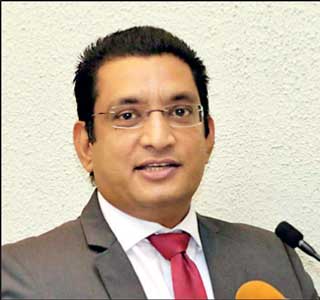Wednesday Feb 18, 2026
Wednesday Feb 18, 2026
Friday, 7 October 2022 00:30 - - {{hitsCtrl.values.hits}}
 |
| Foreign Affairs Minister Ali Sabry
|
The new resolution on the human rights situation in Sri Lanka, sponsored by the Core Group on Sri Lanka and supported by 30 other countries in total, was taken up for action at the concluding segment of the 51st Regular Session of the UNHRC yesterday where it was adopted by a majority vote.
20 countries voted in favour of the resolution while seven voted against it. 20 countries including Sri Lanka’s closest neighbour and long-time ally India abstained from voting. “In finding a feeling of lasting peace and reconciliation in Sri Lanka, India has always respected the demand for equality for Tamils and Sri Lanka’s territorial integrity,” the Indian ambassador to the UNHRC said as India urged Sri Lanka to recognise legitimate aspirations of the Tamil community.
Only Bolivia, China, Cuba, Eritrea, Pakistan, Uzbekistan and Venezuela came through for Sri Lankan and voted against the resolution in support of Sri Lanka. China opposed the resolution assuring its firm support for Sri Lanka’s independence.
“Without consent from the country concerned, the resolution is a product of politicisation,” its representatives said.
Venezuela slammed the resolution as a ‘hostile initiative’ and applauded Sri Lanka’s ‘restoration of peace’ since 2009. The ambassador claimed it is a violation of the sovereignty of countries in the South and spoke against ‘dark interests’.
Sri Lanka as intimated previously categorically rejected the new resolution on the human rights situation in the country, which it said was presented without Sri Lanka’s consent or consultation. Foreign Affairs Minister Ali Sabry addressing the UNHCR said the resolution is divisive and polarising contrary to the founding values of the UNHRC. He said therefore Sri Lanka categorically rejects the UNHRC resolution. “This resolution is not helpful to Sri Lanka,” he said.
The resolution requests the Office of the High Commissioner for Human Rights (OHCHR) to enhance its monitoring and reporting on the situation of human rights in Sri Lanka, including on progress in reconciliation and accountability and on the human rights impact of the economic crisis and corruption.
The office has also been requested to present oral updates to the Human Rights Council at its 53rd session and 55th sessions and a written update at its 54th session and a comprehensive report that includes further options for advancing accountability at its 57th session in 2024.
The new resolution also expresses concern over the human rights developments since April 2022 including violence against and arrests of peaceful protesters as well as violence against Government supporters, resulting in deaths, injuries, destruction and damage to the houses of MPs.
The resolution has also sought to extend and reinforce the capacity of the Office of the High Commissioner to collect, consolidate, analyse and preserve information and evidence and to develop possible strategies for future accountability processes for gross violations of human rights or serious violations in Sri Lanka.